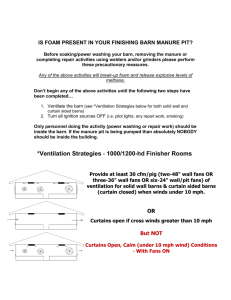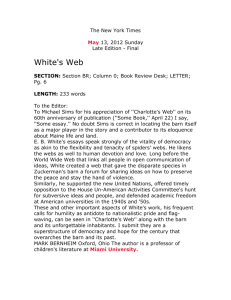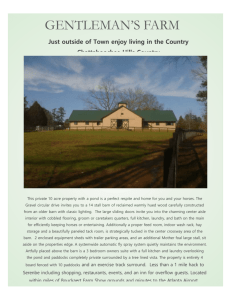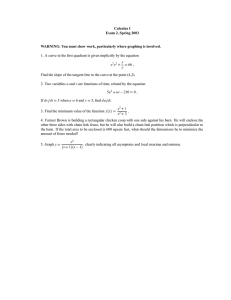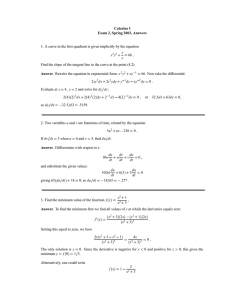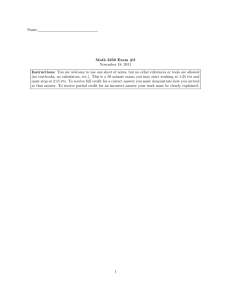closing barns for an extended period of time
advertisement
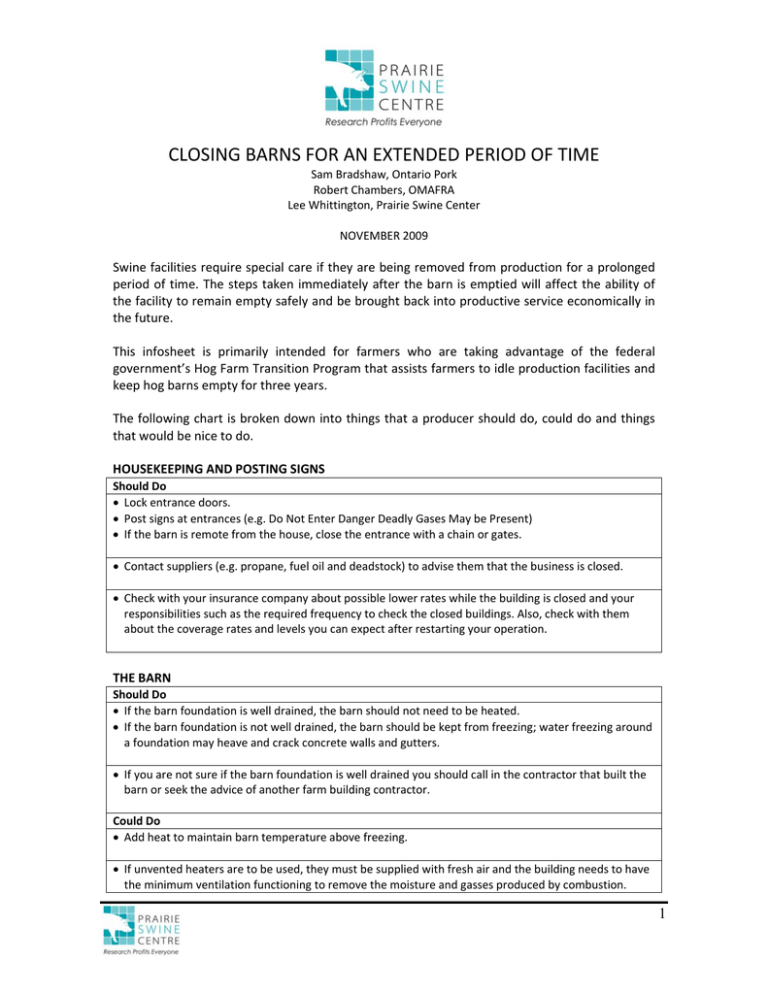
CLOSING BARNS FOR AN EXTENDED PERIOD OF TIME Sam Bradshaw, Ontario Pork Robert Chambers, OMAFRA Lee Whittington, Prairie Swine Center NOVEMBER 2009 Swine facilities require special care if they are being removed from production for a prolonged period of time. The steps taken immediately after the barn is emptied will affect the ability of the facility to remain empty safely and be brought back into productive service economically in the future. This infosheet is primarily intended for farmers who are taking advantage of the federal government’s Hog Farm Transition Program that assists farmers to idle production facilities and keep hog barns empty for three years. The following chart is broken down into things that a producer should do, could do and things that would be nice to do. HOUSEKEEPING AND POSTING SIGNS Should Do Lock entrance doors. Post signs at entrances (e.g. Do Not Enter Danger Deadly Gases May be Present) If the barn is remote from the house, close the entrance with a chain or gates. Contact suppliers (e.g. propane, fuel oil and deadstock) to advise them that the business is closed. Check with your insurance company about possible lower rates while the building is closed and your responsibilities such as the required frequency to check the closed buildings. Also, check with them about the coverage rates and levels you can expect after restarting your operation. THE BARN Should Do If the barn foundation is well drained, the barn should not need to be heated. If the barn foundation is not well drained, the barn should be kept from freezing; water freezing around a foundation may heave and crack concrete walls and gutters. If you are not sure if the barn foundation is well drained you should call in the contractor that built the barn or seek the advice of another farm building contractor. Could Do Add heat to maintain barn temperature above freezing. If unvented heaters are to be used, they must be supplied with fresh air and the building needs to have the minimum ventilation functioning to remove the moisture and gasses produced by combustion. 1 RODENTS Should Do Clean up any spilled feed. Bait stations should be maintained to eliminate rodents. Check or maintain bait stations at least monthly, more often at the start of cold weather. Bait stations need to be placed where rodents congregate such as near a water supply or in attics. UTILITY ROOM Should Do Drain and flush the hot water heater. Shut off main switch on main electrical panel if no fans or heaters are running. Could Do If the main panel is under 500 amps and if you are comfortable with this: 1. Shut off the main breaker. 2. Remove front cover (after shutting off main breaker). 3. Blow out with air. 4. Insert some desiccant. Otherwise, call an electrician for this service. Could maintain some heat in this room to keep moisture away from any electronic equipment. PENNING AND EQUIPMENT Should Do Clean penning and equipment with a pressure washer. Would be nice to do Spray any metal penning and metal equipment with machine oil. MANURE SYSTEM Should Do Manure left in gutters or tanks under the barn is the main culprit in degrading the metal in penning and equipment, and a source of dangerous gases. Remove as much manure as possible in gutters/tanks under slats using normal procedures and then flush with water to remove any buildup and/or remaining manure; clean and flush gutters until you see bare concrete in the channel. If gutters are left dirty: gas may buildup, leading to possible explosion and human safety issue gas will degrade metal penning etc. manure will dry out and will not re‐wet, making it difficult to restart gutter. Empty pipes and/or gutters to and from transfer pit. Empty transfer pit if inside barn as this can cause a gas issue. If transfer pit is outside, pump contents of transfer pit to below frost level. If all manure is not removed ‐ leave minimum ventilation fans running or some natural ventilation vents partially open to avoid human asphyxiation due to gas buildup and possible explosion if a spark is generated. 2 OUTSIDE MANURE STORAGES Should Do Concrete tanks: leave 3 ‐ 4 feet of manure in the bottom to prevent the floor from heaving due to possible freezing or pressure from high ground water in the spring. Earthen storage: pump out manure, but leave ½ full to maintain wall and floor integrity. WATER SYSTEM Should Do Remove nipple drinkers from end of runs and blow lines with air. Remove nipple drinkers from all other drop pipes and allow to drain. Wet dry feeders: disconnect nipple and remove feeder to clean. Could Do After opening end of pipes, flush water lines with water to remove buildup of rust. FEED SYSTEMS—BINS Should Do Empty the bins Could Do Leave access hatch in boot open to drain condensation or drill a hole in the boot. The hole can be plugged later with a bolt. Nice to Do Pressure wash inside of bins to remove any feed and dust to avoid rust due to condensation. FEED SYSTEMS—AUGERS, FEEDERS Should Do • Wet dry feeders: disconnect water nipple and remove the feeder to clean. • Run dry whole grain/sawdust through mix mills and augers to clean out feed containing salts. • Grease any fittings on motors and oil any chains. Could Do • Blow dust off motors, switches, etc. • Loosen drop tubes and push aside to make sure that all the feed is out of the auger. 3 VENTILATION SYSTEM Should Do Wash fans and louvers. Close fans with a winter closure feature if available. If manufacturer fan covers are not available tape heavy mil plastic on the inside of the barn over the opening to prevent outside moisture from migrating in and to prevent any in‐barn gases from damaging the fan and louvers. Could Do Close air inlets to avoid moisture entering attic. Nice To Do Turn all fans on once per year for 15 minutes. You might want to spin by hand before turning on power to check if they have become seized. Open any controllers and place some desiccant inside; make sure any openings are sealed. HEATERS—GAS OR ELECTRIC Should Do Blow out with air. Accumulated dust is full of salts and will turn into sludge and cause rust. IN FLOOR HEATING SYSTEM Should Do Check strength of anti freeze in floor heating system. Could Do Blow fluid out of lines. The authors would like to acknowledge the valuable information shared by Mr. Angus Chambers, Manager JSR Genetics Canada in the preparation of this document. This infosheet was developed in partnership with: 4
